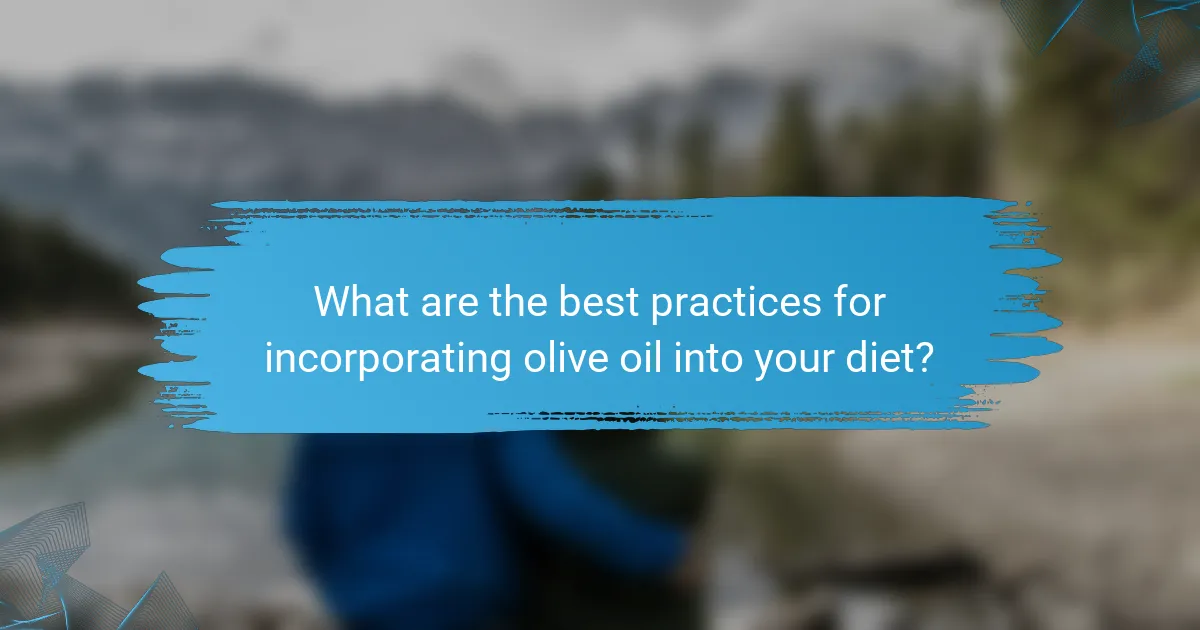Olive oil is a powerhouse for heart health, offering anti-inflammatory and antioxidant benefits. Its culinary uses range from cooking to enhancing flavours in Mediterranean dishes. Sustainable production practices, such as organic farming and water conservation, ensure quality and environmental responsibility. Exploring unique olive oil varieties can further elevate both health benefits and culinary experiences.

What are the health benefits of olive oil?
Olive oil offers numerous health benefits, including heart health improvement, anti-inflammatory properties, and antioxidant effects. It is rich in monounsaturated fats, which can lower bad cholesterol levels. Studies show that regular consumption may reduce the risk of chronic diseases. Additionally, olive oil contains compounds like oleocanthal, which has been linked to reduced inflammation.
How does olive oil contribute to heart health?
Olive oil significantly contributes to heart health by reducing inflammation and lowering bad cholesterol levels. It contains monounsaturated fats, which improve cardiovascular function. Studies show that regular consumption can decrease the risk of heart disease. The unique attribute of extra virgin olive oil is its high antioxidant content, particularly oleocanthal, which has anti-inflammatory properties.
Which antioxidants are found in olive oil?
Olive oil contains several antioxidants, including oleocanthal, oleuropein, and hydroxytyrosol. These compounds contribute to its anti-inflammatory and health-promoting properties. Oleocanthal, for example, has been shown to have effects similar to ibuprofen in reducing inflammation. Hydroxytyrosol is recognised for its strong antioxidant capacity, protecting cells from oxidative stress.
What role does olive oil play in weight management?
Olive oil can aid in weight management by promoting satiety and reducing overall calorie intake. Its healthy fats, particularly monounsaturated fats, help regulate hunger hormones. Studies indicate that incorporating olive oil into a balanced diet can lead to better weight control. Additionally, its antioxidant properties support metabolic health, which is essential for maintaining a healthy weight.
How can olive oil improve skin health?
Olive oil significantly improves skin health due to its moisturising, anti-inflammatory, and antioxidant properties. It hydrates the skin, reduces irritation, and protects against oxidative stress. Rich in vitamin E, olive oil also promotes skin elasticity and repair. Regular use can enhance overall complexion and prevent premature aging.

How is olive oil used in culinary practices?
Olive oil is used in culinary practices for cooking, dressing salads, and enhancing flavours. Its versatility allows it to be a base for sauces and marinades. The unique flavour profile of extra virgin olive oil elevates dishes, making it a staple in Mediterranean cuisine. Additionally, it serves as a healthier fat option, rich in monounsaturated fats and antioxidants.
What are the different types of olive oil and their uses?
There are several types of olive oil, each with distinct uses. Extra virgin olive oil is ideal for dressings and dips due to its rich flavour. Virgin olive oil suits light cooking and sautéing. Pure olive oil, a blend, works well for frying. Light olive oil, with a milder taste, is perfect for baking. Pomace olive oil, a byproduct, is often used in commercial cooking. Each type retains unique attributes that cater to specific culinary applications.
How can olive oil enhance flavour in cooking?
Olive oil enhances flavour in cooking by adding richness and depth to dishes. Its unique compounds, such as phenols and oleocanthal, contribute to a complex taste profile. Different varieties of olive oil offer distinct flavour notes, ranging from fruity to peppery. For example, extra virgin olive oil can elevate salads, pastas, and grilled vegetables with its robust taste. Additionally, using olive oil as a finishing touch can intensify flavours, making it a versatile ingredient in various cuisines.
Which dishes benefit most from olive oil?
Dishes that benefit most from olive oil include salads, pasta, grilled vegetables, seafood, and bread. Olive oil enhances flavour and adds health benefits to these dishes.
Salads gain freshness and richness, while pasta dishes benefit from a smooth texture. Grilled vegetables absorb the oil’s flavour, complementing their natural sweetness. Seafood dishes become more succulent with olive oil’s seasoning properties. Bread, especially when dipped in olive oil, offers a delightful taste experience.
How should olive oil be stored for maximum freshness?
To maximize freshness, store olive oil in a cool, dark place away from heat and light. Use a tightly sealed container, preferably dark glass or stainless steel, to minimize oxidation. Avoid storing it near the stove or in the refrigerator, as temperature fluctuations can degrade quality. Aim to consume within six months to a year after opening for optimal flavour and health benefits.

What sustainable practices are involved in olive oil production?
Sustainable practices in olive oil production include organic farming, water conservation, and waste management. Organic farming eliminates synthetic pesticides and fertilizers, promoting soil health. Water conservation techniques, such as drip irrigation, minimize water usage. Waste management practices, like using olive pomace for biofuel, reduce environmental impact. These methods enhance the quality of olive oil while preserving ecosystems.
How does organic farming impact olive oil quality?
Organic farming enhances olive oil quality by promoting healthier trees and superior flavour profiles. This method avoids synthetic pesticides and fertilizers, resulting in higher antioxidant levels and a more robust taste. Studies indicate that organic olive oils often have lower acidity, which contributes to their overall quality. Additionally, organic practices support biodiversity, leading to a more balanced ecosystem that benefits olive production.
Which regions are known for sustainable olive oil production?
Regions known for sustainable olive oil production include Spain, Italy, Greece, and Tunisia. These areas emphasize organic farming, biodiversity, and eco-friendly practices. Spain, particularly Andalusia, leads in production volume while Italy is renowned for its quality and traditional methods. Greece focuses on small-scale, family-run farms that prioritize sustainability. Tunisia is emerging as a significant player with increasing organic certifications.
What certifications indicate sustainable olive oil?
Certifications indicating sustainable olive oil include the USDA Organic, EU Organic, and the International Olive Council (IOC) certifications. These certifications ensure environmentally friendly practices and high-quality production standards. Additionally, certifications like Protected Designation of Origin (PDO) and Protected Geographical Indication (PGI) verify the origin and authenticity of the olive oil. Each certification reflects commitment to sustainable agriculture and quality assurance.

What are the unique attributes of high-quality olive oil?
High-quality olive oil is characterized by its low acidity, rich flavour, and high levels of antioxidants. These unique attributes distinguish it from lower-quality oils. Low acidity, typically below 0.8%, indicates freshness and proper processing. A robust flavour profile can include fruity, peppery, or nutty notes, enhancing culinary dishes. High antioxidant content, particularly oleocanthal and oleuropein, contributes to health benefits, including anti-inflammatory properties.
How can you identify premium olive oil?
To identify premium olive oil, look for extra virgin classification, low acidity (below 0.8%), and a harvest date on the label. Premium olive oils often have a robust flavour profile and a fruity aroma. Check for certifications like PDO or PGI, which indicate quality standards. Consider tasting notes; high-quality oils should have a balanced taste with a hint of bitterness or spiciness.
What are the sensory characteristics of top-grade olive oil?
Top-grade olive oil exhibits distinct sensory characteristics, including a fruity aroma, a peppery taste, and a smooth texture. These attributes indicate high quality and freshness. The oil’s colour ranges from green to gold, influenced by the olive variety and ripeness. A well-balanced oil also features bitterness, enhancing its complexity.

Which rare varieties of olive oil are worth exploring?
Exploring rare varieties of olive oil can enhance culinary experiences and health benefits. Notable options include:
1. **Taggiasca** – Known for its fruity flavour and complexity, ideal for dressings.
2. **Cornicabra** – Offers a robust taste with a hint of bitterness, great for dipping.
3. **Picholine** – Features a peppery finish, often used in gourmet dishes.
4. **Arbequina** – Delivers a smooth, nutty flavour, popular in Spanish cuisine.
5. **Frantoio** – Characterized by its herbal notes, excellent for drizzling on vegetables.
6. **Leccino** – Mild and fruity, perfect for baking and marinades.
These unique varieties provide distinct flavours and health properties, making them worth exploring.
What makes single estate olive oils unique?
Single estate olive oils are unique due to their traceability, flavour profiles, and production methods. They come from a single location, ensuring consistent quality and taste. This specificity allows for unique attributes, such as distinct regional flavours influenced by local soil and climate. Additionally, single estate oils often undergo meticulous harvesting and processing, enhancing their health benefits, such as high antioxidant content. These practices contribute to sustainable production, aligning with consumer preferences for environmentally responsible choices.
How do local varieties influence flavour profiles?
Local varieties significantly influence flavour profiles by introducing unique characteristics tied to their specific growing conditions. Factors such as soil type, climate, and cultivation methods contribute to the distinct taste of olive oils. For example, oils from the Mediterranean region often exhibit fruity and peppery notes, while those from other areas may have milder or more herbaceous flavours. This diversity enhances culinary uses, allowing chefs to select oils that complement specific dishes or enhance health benefits. Local varieties also support sustainable production practices by promoting biodiversity and preserving traditional farming methods.

What are the best practices for incorporating olive oil into your diet?
Incorporating olive oil into your diet enhances flavour and offers numerous health benefits. Use extra virgin olive oil for salad dressings to maximize its antioxidants. Drizzle it over vegetables or grains to enrich meals with healthy fats. Cooking with olive oil at low to medium heat preserves its nutritional value. Consider using it as a dipping oil for bread or as a base for marinades. Aim for a daily intake of about two tablespoons to reap its heart-healthy advantages.
What common mistakes should be avoided when using olive oil?
Common mistakes to avoid when using olive oil include selecting low-quality oils, overheating the oil, storing it improperly, and using it in place of all cooking fats. Choosing extra virgin olive oil ensures better flavour and health benefits. Heating olive oil beyond its smoke point can lead to the formation of harmful compounds. Store olive oil in a cool, dark place to maintain its quality. Finally, while olive oil is versatile, it may not be suitable for all culinary applications, such as deep frying.
How can you maximize the health benefits of olive oil in meals?
To maximize the health benefits of olive oil in meals, use it as a primary fat source, incorporate it into dressings, and avoid high-heat cooking. Olive oil is rich in monounsaturated fats and antioxidants, promoting heart health and reducing inflammation. Drizzling it over vegetables or salads enhances nutrient absorption, particularly fat-soluble vitamins. Additionally, choosing extra virgin olive oil ensures the highest quality and health benefits due to its minimal processing.